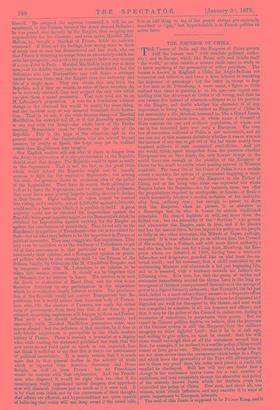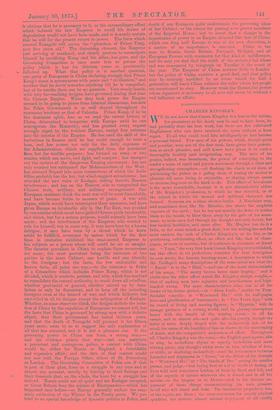THE EMPEROR OF CHINA.
" THE Viceroy of India and the Emperor of China govern half the human race " with absolute political autho- rity ; and in Europe, which like Rome calls and thinks itself
"the world," no man outside a minute circle cares to study or to know anything of the personality of either potentate. The former is known in England a little, for Anglo-Indians are numerous and talkative, and have a keen interest in- watching the dispenser of patronage ; but the latter is, except to four or five men in St. Petersburg, a mere name, a figure so little realised that there is question as to his age—one expert con- tending that the Almanach de Gotha is all wrong, and that he was twenty-five instead of nineteen—dispute as to his position in the Empire, and doubt whether his character is of any importance to living being,—whether an Emperor of China is not necessarily a Roi faineant, hemmed in, like a Grand Lama, by inexorable ceremonial laws in whose name a Council of State controls the vast and civilised population, of whom not ' one in ten thousand have ever seen a European. The very
law of succession followed at Pekin is not understood, and no S one can say at this moment definitely whether it was or was not the interest of any one to get rid of the lad whom nearly four hundred millions of men accounted semi-divine. And yet one would think, apart altogether from the question whether Europeans are, as they fancy, the only human beings in the world, there was enough in the position of the Emperor of China for his death to excite some passing interest in Western mankind. The inner life of the Court of Pekin is to a certain extent a mystery, the system of government implying a semi- sacredness in the person of the Emperor as the Father of China, and as the being who alone can represent the whole Empire before the Supreme—he, for instance, alone can offer the propitiations required by earthquake, or famine, or flood— which necessarily involves a careful seclusion of his individu- ality from ordinary eyes ; but enough is patent to show that the Emperor, when he pleases, is as absolute as a Sovereign can be who is bound by certain traditional principles. He cannot legislate at will, any more than the Sultan can ; but the hierarchy of the " Services " who govern and administer the Empire ends in him, and if he pleases and has the mental force, he can impose his policy on his people as fully as any other sovereign, the Mikado of Japan, perhaps, excepted. It is true, affairs can go on without him, the Council of Six acting like a Cabinet, and with more direct authority; and this has been the case for a long time, Hienfung, the Em- peror whom we defeated in 1860, having been a worn-out debauchee and drug-eater, guarded like an idol from the ex- ternal world ; and his successor, first a child controlled by an overbearing Minister, and afterwards a lad just beginning life, and as is asserted, with a tendency towards his father's de- bilitating vices. It is true, too, that the group of nobles and statesmen immediately around the throne have in the long in- terregnum of thirteen years possessed themselves of the springs of power to a degree formerly unknown ; that Toungchi, the lad just dead, failed in a most extraordinary manner in a desperate effort to emancipate himself from Prince Rung, whom he dismissed and degraded one week for disrespect to the throne, and next week was compelled to reinstate in all his honours and offices ; and that it may be the policy of the Council to endeavour, during a succession of minorities, to perpetuate their power. But no expert in Chinese politics doubts, we believe, that the keystone of the Chinese system is still the Emperor, that the millions recognise no other rightful Lord ; that if he is of full age, and willing to give orders, he must be obeyed ; that his will alone would outweigh that of all the statesmen around him ; that, for example, if he inclined to a warlike policy, China would sooner or later go to war. The ceremonies which hedge him in are not more severe than the ceremonies which hedge in a Pope, and which leave the personality of the Pope still all-important, nor is there any proof that, his order once passed, it could till recalled be disobeyed. Still less will any one doubt that a change in the succession leaves room for a vast number of ambitions, and may completely change the character and policy of the scarcely known Junta which for thirteen years has controlled the policy of China. New men, and above all, new women, must obtain influence, and may exercise it in ways of grave importance to European interests. The soul of this Junta is supposed to be Prince Kung, and it
is obvious that he is necessary to it, or the extraordinary effort which induced the late Emperor to recall his decree of degradation would not have been made, and it is nearly certain that he will for the present return to power. The force which coerced Toungchi will coerce the " grandson of Prince Tung, now five years old." The disturbing element, the Emperor just arriving at manhood, and clearly anxious to emancipate himself by sacrificing Rung and his allies,.has gone, and the Governing Committee is once more free to pursue the policy which it has for thirteen years so persistently followed up. What that policy is is another question, one party of Europeans in China declaring strongly that Prince Rung's name is synonymous with peace and " civilisation," and another that he never concedes anything till he is compelled, but of its results there can be no question. Very steady hands, with very far-reaching designs, have governed during that time the Chinese Empire. When they took power the Empire seemed to be going to pieces from internal dissensions, but now the Pekin Government is as well obeyed throughout its enormous territory as that of Calcutta. Prince Rung, if he be the dominant spirit, has, as we read the recent history of China, determined to temporise with Europe until he can reinvigorate the Monarchy, and has granted every request strongly urged by the resident Envoys, except free entrance into the interior of the Empire. He has used the skill of the barbarians in finance until he has credit enough to raise a loan, and has money not only for the daily expenses of the Administration, which are supplied from the provincial fiscs, but for warlike purposes ; has formed an army, or two armies, which can move, and fight, and conquer ; has stamped out the embers of the dangerous Taeping movement ; has not only crushed but extirpated the Mohammedans of the West ; has alarmed Nepaul into some transactions of which the India Office probably has the key, but which suggest submissions ; has attacked the new ruler of Kashgar, risking thereby Russian interference ; and has on the Eastern side so reorganised the Chinese forts, artillery, and military arrangements that European residents think the next war will be most formidable, and have become liable to accesses of panic. A war with Japan, which would have interrupted these measures, and have given Europe an invaluable ally in the Far East, was avoided by concessions which must have galled Chinese pride intolerably, and which, but for a serious purpose, would scarcely have been made ; and the interference of the Emperor, who wanted to rule for himself, was in some way, it may have been by a harem intrigue, it may have been by a threat which he knew could be fulfilled, overcome by means which for the first time in centuries exhibited the semi-sacred Emperor to his subjects as a person whose will could be set at naught. The theories prevalent in China to explain these occurrences are many, the most prevalent being the existence of two parties in the inner Cabinet, one hostile and one friendly to the foreigner ; but the facts, the few undeniable and known facts, all point one way,—to the existence in Pekin of a Committee which includes Prince Rung, which is not divided, which is resolute, patient, and able, which has resolved to consolidate the central authority, to crush down all rebellion, whether provincial or general, whether stirred up by fana- ticism or only by discontent, and to keep off the intruding foreigner even at the hazard of war, and which hitherto has succeeded in all its designs except the subjugation of Kashgar. Whether, as some observers think, the designs include the isola- tion of China by the expulsion of Europeans we cannot tell, but the facts that China is governed by strong men with a definite object, that their government has lasted thirteen years, and that the death of Toungchi will protract it for fifteen years more, seem to us to suggest the only explanation of all that has occurred, and it is not a pleasant one. If the governing power in China can form a strong army— and the evidence points that way—and can maintain a persistent and courageous policy, a contest with China would be, either for Russia or England, a formidable and expensive affair; and the date of that contest would not rest with the Foreign Office, either of St. Petersburg or London. The Governing Committee of Pekin can, if that is part of their plan, force on a struggle in any year and at almost any moment, merely by hinting to their Satraps and their Generals that, on the whole, the hour for a struggle has arrived. Russia could not sit quiet and see Kashgar occupied, or Great Britain bear the seizure of Khatmandoo—which has happened once before—or Europe generally endure the sum- mary extinction of the Whites' in the Treaty ports. We pre- tend to no special knowledge of dynastic politics in Pekin, and doubt if any European quite understands the governing ideas of her Cabinet, or the reason for passing over grown members of the Imperial House ; but to assert that a change in the depositaries of power in an Empire situated like that of China, which can drag half Europe to war at its own discretion, is a matter of no importance, is unsound. China is too near to Russia, Great Britain, Portugal, Holland, and all European Powers with commerce for that kind of indifference, and we may yet find that the death of the secluded lad whose end was announced by telegraph on Tuesday is the event of the year. The Emperor of China matters little to Londoi but the policy of China matters a good deal, and that policy may be seriously modified by an event which for half a generation will leave China without the ruler whom her people are accustomed to obey. However weak the throne, the person whose signature is necessary to all acts will never be without a real influence on affairs.



































 Previous page
Previous page